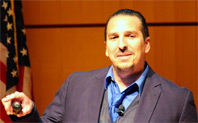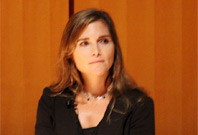 Context and perspective was provided by the founders of LawWithoutWalls, Miami Law Associate Professor Michele DeStefano and Michael Bossone, Special Advisor to Dean Patricia D. White. See video here.
Context and perspective was provided by the founders of LawWithoutWalls, Miami Law Associate Professor Michele DeStefano and Michael Bossone, Special Advisor to Dean Patricia D. White. See video here.
A second-day address by John Browning, a Dallas attorney and author of the first social-media textbook, "The Lawyer's Guide to Social Networking," was equally enlightening.
The panel on the so-called "digital afterlife" focused on the fate of digital property after its owner's death or incapacitation. The panel tackled intriguing questions such as who can access digital property such as legacy pages on Facebook created for a lost loved one or Twitter accounts created in the name of a deceased owner.
A panel on accessibility illuminated the challenges of the Internet for individuals with disabilities. With panelists from the worlds of litigation and regulation, including a local disability rights lawyer and an FCC regulator, it was an enlightening discussion, focusing on the relationship between individuals with disabilities and the web, apps, and social networks. Another panel looked at the question of how new technology can create pitfalls for the ethics of lawyers and judges. Is it acceptable for lawyers and judges to be friends on Facebook? If a client communicates with a lawyer through social media, what effects do user licensing agreements have on the attorney-client privilege? This panel featured distinguished members and chairs of state ethics committees as well as Magistrate Judge James Hopkins of the Southern District of Florida, and Miami Law's ethics guru, Jan Jacobowitz. The panel was especially important for the students and practitioners in attendance as they face a world of new technology and new ethical dilemmas.
Another panel looked at the question of how new technology can create pitfalls for the ethics of lawyers and judges. Is it acceptable for lawyers and judges to be friends on Facebook? If a client communicates with a lawyer through social media, what effects do user licensing agreements have on the attorney-client privilege? This panel featured distinguished members and chairs of state ethics committees as well as Magistrate Judge James Hopkins of the Southern District of Florida, and Miami Law's ethics guru, Jan Jacobowitz. The panel was especially important for the students and practitioners in attendance as they face a world of new technology and new ethical dilemmas.

